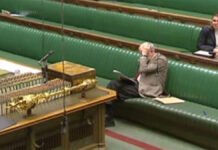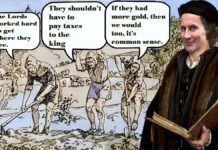Boris Johnson insisted the U.K. will not engage in a “race to the bottom” on competition standards after Brexit.
On the first working day of his administration in the post-Brexit world, he laid out his negotiating terms for where trade talks with the European Union go from here. His stance was clear saying: “Well folks, I hope you’ve got the message by now. We’ve made a choice. We want a comprehensive free-trade agreement similar to Canada’s, but in the unlikely event that we do not succeed, our trade will have to be based on our existing withdrawal agreement with the EU.”
In a speech at the grand painted hall of the Old Royal Naval College in Greenwich, the U.K. prime minister said he wants to “reassure” Brussels over fears Britain will undercut the EU on working rights, environmental standards and state aid.
“We will not engage in some cut-throat race to the bottom,” he told an audience of ambassadors and business leaders about the trade deal he hopes to strike with the bloc and other nations around the world. “We are not leaving the EU to undermine European standards, we will not engage in any kind of dumping, whether commercial, or social, or environmental.”
However the European Union and Britain clashed over a post-Brexit trade deal on Monday when Boris Johnson insisted there was no need to sign up to the bloc’s rules resulting in Brussels warning of tariffs and quotas unless he does.
Boris Johnson said :”There is no need for a free trade agreement to involve accepting EU rules on competition policy, subsidies, social protection, the environment or anything similar.”
However, a spokesman for the prime minster later suggested an agreement on competition rules is possible — but would not require the two sides writing any such agreements into law. The government also published a rough list of its negotiating objectives.
Johnson insisted the U.K. wants to negotiate fishing quotas on an annual basis.
The spokesman suggested the outcome could mirror the EU deal with Canada, which specifically notes that EU and Canadian working rights and environmental protections are integrated into the deal. The Canada deal also created a level playing field over intellectual property rights and strengthened copyright protections.
In his speech, Johnson pitched directly for a Canada-style free-trade agreement with the bloc — although he insisted that if the EU was not willing to sign up to agreement without level playing field rules, the U.K. could leave with an Australian-style deal.
That would mean trading on World Trade Organisation terms but with some mini-deals in specific sectors. But the prime minister refused to accept that such an arrangement would amount to a no-deal Brexit, repeatedly insisting the U.K. already has a deal in the Withdrawal Agreement.
Elsewhere, Johnson insisted the U.K. wants to negotiate fishing quotas on an annual basis, despite the EU wanting a longer-term pact, and said Britain would be negotiating for all its constituent parts, including Gibraltar. Brussels, however, is ready to propose a separate mandate for talks on resolving the Gibraltar question, a senior EU official told reporters today.
Johnson also said the U.K. would be able to negotiate multiple free-trade agreements at once in a “great multidimensional game of chess.” He made clear that a deal with the U.S. was high on the list.
Barnier warns that both sides need to prepare for the prospect of a “cliff edge”

The EU’s Michel Barnier
“First, we need to make sure competition is and remains open and fair (…) We must now agree on specific and effective guaranties to ensure a level-playing field over the long term.”
Johnson appears to be taking a much tougher negotiating stance than his predecessor, Theresa May.
Barnier warns that both sides need to prepare for the prospect of a “cliff edge” no deal at the end of the year.
Now that Britain has officially left the EU, both sides have until the end of the year to secure a deal. Both want to get that done, but on very different terms. While Johnson says the UK can what he called the ”superman” of free trade, and will not adhere to the bloc’s rules and regulation, EU leaders say the further Britain diverges from their rules the less access it will have to the EU market.
The UK government trade deal proposals
Boris Johnson has pitched two models for his country’s trade ties with the European Union after Brexit: a deal based on the EU’s accord with Canada, or the basic terms the bloc has with Australia.
Johnson used the two countries as examples of EU trade partners which do not adhere to the bloc’s rules, something he has vowed Britain will not do from Jan. 1 2021 when the current 11-month no-change Brexit transition period ends.
The EU’s trade deal with Canada entered force in 2017, eight years after talks began, but the EU does not yet have an agreement with Australia.
Below is an explanation of how the EU trades with both countries.
CANADA
Goods:
The Comprehensive Economic and Trade Agreement (CETA) between the EU and Canada sets out the removal of tariffs on 99% of all goods types, some over a period of up to seven years.
However, it limits volumes of some exports into the EU of pork, beef and frozen lobsters, reflecting Europe’s traditionally protective stance to its farming sector, along with dog or cat food and track suits, ski suits and swimwear.
Services:
CETA offers far less freedom than banks and other firms based in Britain currently have to do business in the EU.
Canadian financial firms need licences to operate in the bloc and must comply with EU regulations. Both sides must treat each other’s sectors equally, but a “prudential carve-out” also allows for measures to limit access.
There are some restrictions for other service industries too.
CETA seeks to allow temporary stays or permit each other’s nationals to provide cultural and audio-visual services for between 90 days and three years.
About half of the CETA text, which stretches to 1,598 pages, is devoted to “reservations”. For example, the Canadian province of Manitoba requires funeral firms to have a licence while the EU says only German residents can open a pharmacy in Germany.
There is some mutual recognition of professional qualifications.
Customs, rules and standards:
Brussels and Ottawa agreed to smooth customs procedures and try to release goods quickly, but both sides will still carry out import checks, notably of all live animals, 15% of fish products and 10% of animal products traded.
CETA seeks to strengthen cooperation on rules and standards but does not include the level of alignment in state aid, the environment and taxation that the EU wants from Britain.
Both sides should seek to avoid anti-competitive behaviour but there are no shared antitrust rules. CETA has little to say on taxation.
Canada and the EU agreed to notify each other every two years on new or continued subsidies.
The EU made demands on labour and environmental standards, including commitments of the Paris climate change accord.
Both sides can still put in place tariffs to counter what they see as dumping or unfair subsidies.
In the case of disputes, CETA envisages first mediation and then resort to a CETA Joint Committee, made up of members from each side. CETA makes no mention of the EU Court of Justice. Johnson has said Britain will not be subject to ECJ oversight.
AUSTRALIA
Australia is currently negotiating a free trade deal with the EU to improve its market access, but for now largely trades with the EU on World Trade Organisation terms. This means it faces some high tariffs on goods it exports to the bloc including its wine.
Australia is not bound by any EU rules but its farmers can send fixed quantities of cheddar and cheese for processing at reduced tariffs, of “high quality beef” at a 20% tariff, as well as grain-fed beef and lamb and goat meat at zero tariffs. Australia shares some of these quotas with other countries and they are filled on a ‘first-come’ basis.
This statement sets out the Government’s proposed approach to the negotiations with the EU about our future relationship. Further details on this and other trade negotiations will be made available to Parliament as the process develops.
The Government wishes to see a future relationship based on friendly cooperation between sovereign equals for the benefit of all our peoples. There is complete certainty that at the end of 2020 the process of transition to that relationship will be complete and that the UK will have recovered in full its economic and political independence. The Government remains committed in all circumstances to securing all those benefits for the whole of the UK and to strengthening our Union.
The question for the rest of 2020 is whether the UK and the EU can agree a deeper trading relationship on the lines of the free trade agreement the EU has with Canada, or whether the relationship will be based simply on the Withdrawal Agreement deal agreed in October 2019, including the Protocol on Ireland / Northern Ireland. In either event the UK will be leaving the single market and the customs union at the end of this year and stakeholders should prepare for that reality.
In its negotiations with the EU, the Government will be acting on behalf of the UK Crown Dependencies and Overseas Territories: the whole UK family.
The UK proposes to agree similar arrangements with the EFTA states.
Further information is set out below. Unless otherwise stated, it should be assumed that the UK’s aspiration and level of ambition is to reach agreement on provisions which are at least as good as those in the EU’s recent trade agreements, such as those with Canada or Japan.
- Free Trade Agreement
A free trade agreement between the UK and EU should reflect, and develop where necessary, existing international best practice as set out, inter alia, in FTAs already agreed by the EU.
It should cover the following areas:
National Treatment and Market Access for Goods
There should be no tariffs, fees, charges or quantitative restrictions between the UK and the EU. There should be a protocol setting out appropriate and modern rules of origin, in order to facilitate trade between the parties to the greatest extent possible.
Trade Remedies
The agreement should enable the UK to protect its industry from harm caused by unexpected surges in imports of goods or by unfair trading practices, while making the appropriate commitments to transparency, due process and proportionate use of trade remedies.
Technical Barriers to Trade
There should be provisions to address regulatory barriers to trade in goods, providing for cooperation on technical regulation, standards, conformity assessment procedures and market surveillance, building on the WTO Technical Barriers to Trade Agreement. Annexes to the agreement could include provisions facilitating trade in specific sectors, such as organic products, motor vehicles, chemicals and pharmaceuticals, as well as mutual recognition agreements focusing on conformity assessment, with full coverage of the relevant sectors.
Sanitary and Phytosanitary Measures
The UK will maintain its own autonomous sanitary and phytosanitary (SPS) regime to protect human, animal and plant life and health and the environment, reflecting its existing high standards. In certain areas it may be possible to agree equivalence provisions to reduce practical barriers to trade at the border.
Customs and Trade Facilitation
Facilitative customs arrangements, covering all trade in goods, should be put in place in order to smooth trade between the UK and the EU. These should ensure that both customs authorities are able to protect their regulatory, security and financial interests.
Cross-Border Trade in Services and Investment
Significant provisions on trade in services are an essential component of a comprehensive FTA. Accordingly, the Agreement should include measures to minimise barriers to the cross-border supply of services and investment, on the basis of each side’s commitments in existing FTAs. In areas of key interest, such as professional and business services, there may be scope to go beyond these commitments.
There should be measures to support digital trade, building on the most recent precedents.
Temporary Entry for Business Purposes (Mode 4)
As is normal in a Free Trade Agreement, the agreement should include significant reciprocal commitments on the temporary entry and stay of individuals, so that both EU and UK nationals can undertake short-term business trips to supply services. This is of course without prejudice to the future points-based immigration system.
Regulatory Framework
There should be measures that reduce unnecessary barriers to trade in services, streamlining practical processes and providing for appropriate regulatory cooperation.
Mutual Recognition of Professional Qualifications
The Agreement should provide a pathway for the mutual recognition of UK and EU qualifications, underpinned by regulatory cooperation, so that qualification requirements do not become an unnecessary barrier to trade.
Financial Services
The Agreement should require both sides to provide a predictable, transparent, and business-friendly environment for financial services firms, ensuring financial stability and providing certainty for both business and regulatory authorities, and with obligations on market access and fair competition. Given the depth of the relationship in this area, there should also be enhanced provision for regulatory and supervisory cooperation arrangements with the EU, and for the structured withdrawal of equivalence findings.
Road Transport
There should be reciprocal commitments to allow EU and UK road transport operators to provide services to, from and through each other’s territories, with associated rights, underpinned by relevant international agreements and commitments, and ensuring the necessary cooperation on monitoring and enforcement.
Competition Policy, Subsidies, Environment and Climate, Labour, Tax
The Government will not agree to measures in these areas which go beyond those typically included in a comprehensive free trade agreement. The Government believes therefore that both Parties should recognise their respective commitments to maintaining high standards in these areas; confirm that they will uphold their international obligations; and agree to avoid using measures in these areas to distort trade.
- Agreement on Fisheries
The UK will become an independent coastal state at the end of 2020 and any agreement must reflect this reality. The UK will, like Norway, Iceland and the Faroe Islands, have annual negotiations with the EU on access to waters and fishing opportunities, and will consider a mechanism for cooperation on fisheries matters.
- Agreement on Internal Security Cooperation
Protection of citizens is the highest duty of any Government. The UK believes it is in the UK’s and EU’s mutual interest to reach a pragmatic agreement to provide a framework for law enforcement and judicial cooperation in criminal matters between the UK and the EU, delivering strong operational capabilities that help protect the public. The detail of such an agreement must be consistent with the Government’s position that the CJEU and the EU legal order must not constrain the autonomy of the UK’s legal system in any way.
- Other Areas of Cooperation
The Government believes there is mutual benefit in an air transport agreement covering market access for air services, aviation safety and security, and collaboration on air traffic management.
The UK is ready to work to establish practical provisions to facilitate smooth border crossing arrangements, as part of independent border and immigration systems, and on social security coordination. All such arrangements should be reciprocal and of mutual benefit. The UK is ready to discuss cooperation on asylum, including family reunion, and illegal migration.
The UK is ready to consider participation in certain EU programmes, once the EU has agreed the baseline in its 2021-2027 Multiannual Financial Framework, and taking into account the overall value to the UK of doing so.
Finally, there are certain areas where the UK considers agreement is self-evidently in the interest of both sides, and where early progress is a test of the constructive nature of the negotiating process. For example, there should be rapid agreement that the UK and the EU would list each other for trade in live animals, animal products, seeds and other plant-propagating material. There should be rapid progress towards a Civil Nuclear Agreement, given the implications for both sides of not doing so and the clear benefits of cooperation. Similarly, the UK would see the EU’s assessment processes on financial services equivalence and data adequacy as technical and confirmatory of the reality that the UK will be operating exactly the same regulatory frameworks as the EU at the point of exit. The UK intends to approach its own technical assessment processes in this spirit. LINK
Support Independent Journalism Today
Our unwavering dedication is to provide you with unbiased news, diverse perspectives, and insightful opinions. We're on a mission to ensure that those in positions of power are held accountable for their actions, but we can't do it alone. Labour Heartlands is primarily funded by me, Paul Knaggs, and by the generous contributions of readers like you. Your donations keep us going and help us uphold the principles of independent journalism. Join us in our quest for truth, transparency, and accountability – donate today and be a part of our mission!
Like everyone else, we're facing challenges, and we need your help to stay online and continue providing crucial journalism. Every contribution, no matter how small, goes a long way in helping us thrive. By becoming one of our donors, you become a vital part of our mission to uncover the truth and uphold the values of democracy.
While we maintain our independence from political affiliations, we stand united against corruption, injustice, and the erosion of free speech, truth, and democracy. We believe in the power of accurate information in a democracy, and we consider facts non-negotiable.
Your support, no matter the amount, can make a significant impact. Together, we can make a difference and continue our journey toward a more informed and just society.
Thank you for supporting Labour Heartlands











